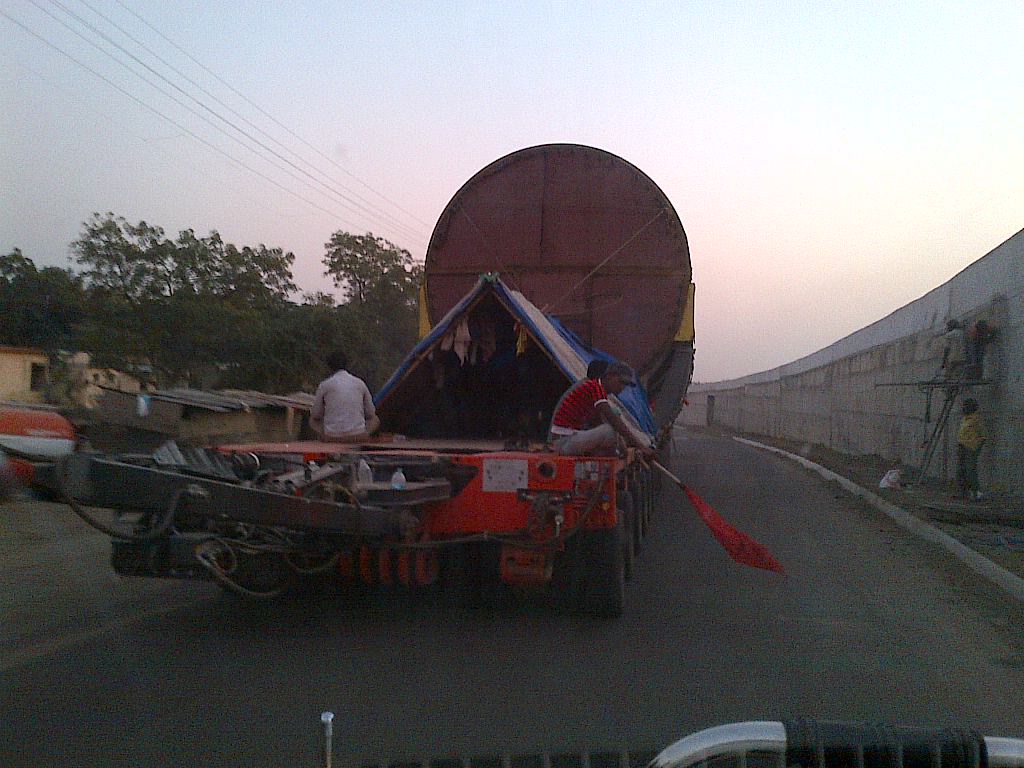Indian Highway Image
November 10, 2011
Workshop on Nationwide Electronic Toll Collection, held at Vigyan Bhawan, New Delhi on June 14, 2011
June 15, 2011
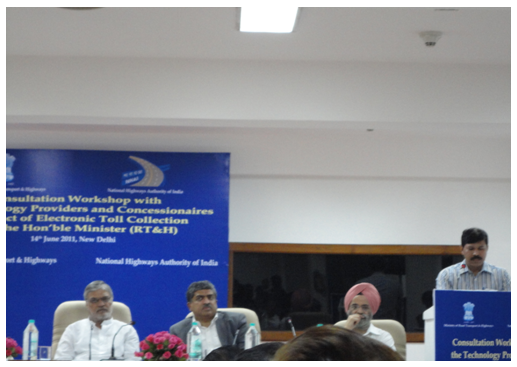
Workshop on Nationwide Electronic Toll Collection
- Mr. C P Joshi , Honrable Minister Road Transport and Highways
- Mr. Nandan Nilkani , Chairman , UIDAI
- Mr. R S GUJRAL , Chairman NHAI
- Mr. Ravi Palekar , GM (Electronics) , NHAI – Addressing the gathering
- Mr. Sachin Bhatia, CEO, Metro Infrasys
Workshop on Nationwide Electronic Toll Collection held at Vigyan Bhawan, New Delhi. With an objective of paving way for a unified Electronic Toll Collection (ETC) technology for National Highways in India, the Ministry of Road Transport & Highways constituted a Committee under the chairmanship of Shri Nandan Nilekani Chairman of UIDAI with a mandate to examine all technologies available for Electronic Toll Collection (ETC) and recommend the most suitable one for implementation throughout India. The other members of the Committee are Prof. Pankaj Jalote, Director, IIIT-Delhi ; Dr. Kolin Paul, Asst. Professor, IIT-Delhi ; Shri A.V. Sinha, DG (Road Development) & Special Secretary, MoRT&H and Shri. V.L. Patankar, Member (Technical), NHAI (Member Secretary).
The Union Minister for Road Transport & Highways Dr. C.P. Joshi has said that we should chalk out a plan to increase the percentage of national highways from present 2.2 % to 5 % in the next 10 years. Delivering inaugural address at the Consultation Workshop with the Technology Providers and Concessionaires in respect of Electronic Toll Collection (ETC) here today, he said that keeping in view the various types of highways there should be a hybrid pattern of toll collection. The Workshop was jointly organized by Ministry of Road Transport & Highways, National Highways Authority of India & National Informatics Centre. The Chairman of UIDAI Shri Nandan Nilkeni & Minister of State for RT&H Shri Tusharbhai A. Chaudhary also addressed the workshop. Shri R.S. Gujral, Secretary Ministry of Road Transport & Highways and Dr. V.K. Gairola, D.G (NIC) were present.
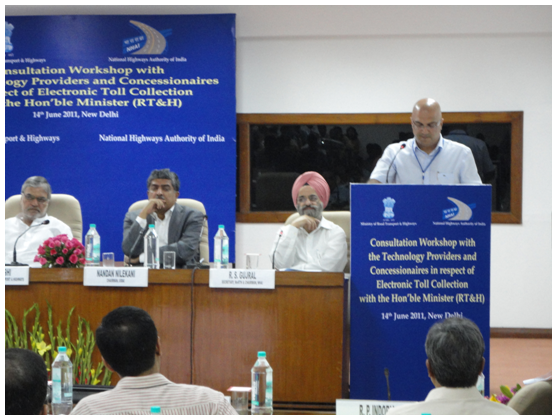
Mr. Sachin Bhatia CEO Metro Infrasys expressing the support from Industry Fraternity
Based on the recommendations of the committee headed by Mr. Nandan Nilekani to use RFID technology for ETC, the Apex Committee, responsible for ETC implementation planning, is in the process of prescribing certain standards which should be complied with all over the country to ensure interoperability. The primary purpose of this workshop was to take feedback from the key stakeholders, comprising concessionaires and ETC technology service providers. Security, cost effectiveness, convenience and scalability have been the main criteria based on which the detailing has been done.
Based on the feedback, the specifications and data detailing will be finalized for open market release. The plan is that the authorized manufacturers will be producing Transceivers and Tags based on these standards, the concessionaires will be procuring these Transceivers and in turn, the technology service providers will be integrating the entire ETC system at the toll plaza. Although details on other aspects like clearing house are being worked out simultaneously, majority of the decisions will depend upon these standards only.
Followings are the Tolling Companies, RFID Manufacturer and concessionaire took part in the workshop:
- Kapsch Metro
- Egis Infra
- L&T Infra
- GMR
- HCC Infrastructure
- JICA
- IRDSA
- DSC
- EFKON India
- Siemens
- IAITO Infotech Pvt. Ltd.
- ESSEN, Mumbai
- ATT System, Banglore
- Mitsubishi
- IBI Group
- Neology
- Steria
- Tag Factory
Brief of discussion over finalization of technology between committee and Industry Peoples:
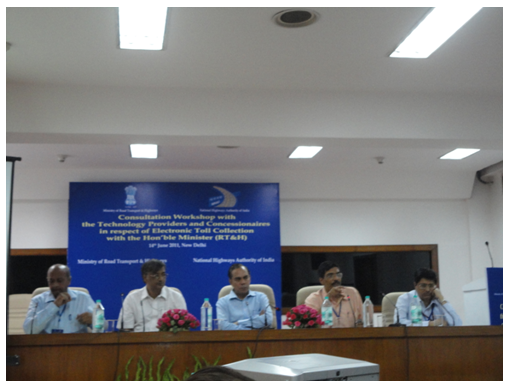
- Dr. B.K. Gairola, Director General, NIC – extreme left
- Dr. Y.K. Sharma, DDG, NIC - middle position
- Dr. Rajat Moona, Director General of CDAC, IIT Kanpur
- Dr. Y.K. Sharma, DDG, NIC - extreme Right
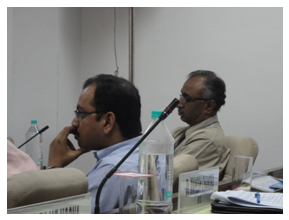 Mr. Venkat from GMR expressed change from IP 66 to IP 65 for the readers as IP 65 is also good enough and IP 66 will increase the cost for the readers without any additional value.
Mr. Venkat from GMR expressed change from IP 66 to IP 65 for the readers as IP 65 is also good enough and IP 66 will increase the cost for the readers without any additional value.
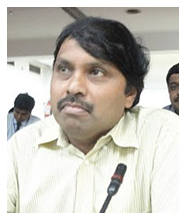 Mr. Hari from Efkon
Mr. Hari from Efkon
He raised an issue over the relative humidity of 100% for Transceiver antenna.
Committee Conclusion :
Committee agreed for the IP 65 standard and 95% relative humidity as it comply against all possible environmental threat at toll scenario.
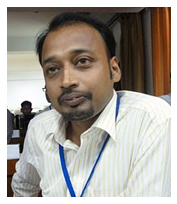 Mr. Anand Shenoy from IAITO Infotech Pvt. Ltd.
Mr. Anand Shenoy from IAITO Infotech Pvt. Ltd.
Raised his voice over minimum requirement of reading of 10 Tags per second with 240 bits of EPC memory and 64 bits of Tag Id.
Committee Conclusion: committee agreed onto change it to 2 Tags per second with above said minimum requirement. On the other query raised by Mr. Shenoy that the data retention period must be 3-4 year for the tag memory instead of 10 years as their is no UV protection asked for the tag and without any special material with the effect of UV rays its hard to maintain the data in tag for 10 years, The committee replied as they will keep it under consideration and if required they will bring it in next phase.
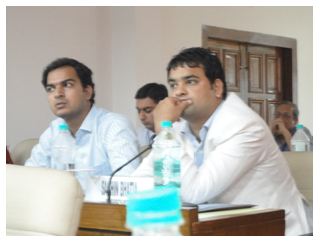 On the query raised by Team from Metro Infrasys- Mr. Nitin Thakur and Mr. Harimohan for the option of having color coded Tags for different class of vehicles, as it will help in operation at toll plazas. The Committee said that it is difficult to see the color in the moving car in the sun. However committee will discuss it in next phase.
On the query raised by Team from Metro Infrasys- Mr. Nitin Thakur and Mr. Harimohan for the option of having color coded Tags for different class of vehicles, as it will help in operation at toll plazas. The Committee said that it is difficult to see the color in the moving car in the sun. However committee will discuss it in next phase.
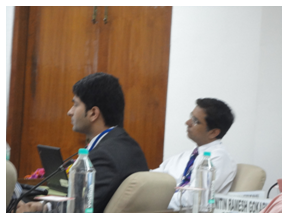 Mr. Vipul Sharma(Left), Mr. Mayank Manish(Right)
Mr. Vipul Sharma(Left), Mr. Mayank Manish(Right)
The long discussed topic was the polarization standard for the antenna, Panel has asked for circular polarization pattern for the antenna but Mr. Vipul Sharma and Mayank Manish from one of the leading manufacturer of RFID Equipment Neology reasoned to have it linearly polarized due to its long range and less interference phenomenon, also linearly polarized antennas can work at higher speed , committee keep this for discussion and will revert again.
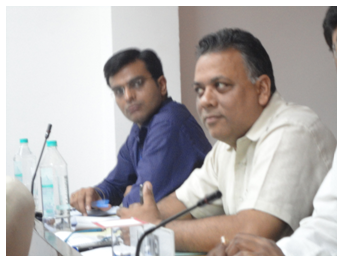 Mr. Manoj Agarwal and Mr. Manish from Delhi Gurgaon Expressway strongly supported the idea of a law for putting a penalty on cash vehicles coming to Tag lane .
Mr. Manoj Agarwal and Mr. Manish from Delhi Gurgaon Expressway strongly supported the idea of a law for putting a penalty on cash vehicles coming to Tag lane .
For the standard for the communication between plaza server and CCH server, there will be addition of Plaza id into the prescribed format by the committee. Plaza level fare plan and policy will be governed by the plaza itself while the global discount will be governed by the CCH server and will be updated in all the plaza server by CCH server itself. Committee also agreed to look into the various aspects of fare plans at different plazas.
Highlights of the Workshop:
ETC critical components:
Tag Distribution Channel & Inventory Management
- On-line channels by user
- Authorized service centers of vehicles (Service centre need to install the SPV client software and antenna connection), since centre must have authorized people to affix tags.
- RTO(Operation is similar to above)
- Vehicle dealer network(Operation is similar to above)
- Authorized point of sale installation(POS can be insurance companies, PUC centers, Petrol Pumps etc; Operation is similar to above)
Inventory Management of Tags:
SPV will keep track of allocated EPC Ids, Tag Ids etc. It will perform a demand forecast Tags and keep the tags available for distribution through distribution channel.
Handling Special Cases
- Valid ETC enabled vehicle was ejected due to non-read of Tag – Premium cash lane should verify it with the ETC database.
- Clone Tag – If customer complains/suspects that his/her Tag is cloned, Tag re-initiation is to be done for same Tag. Old Tag value is marked for special handling.
- Change in registration number of vehicle – Vehicle should approach distribution channel network and get a new tag. Old tag is to be destroyed physically and listed for special handling.
- De-registration of vehicle (due to destruction/ end of life/ Export etc.)-Tag is to be destroyed physically and listed for special handling.
Listing for Special Attention
Vehicle is listed for special attention following conditions:
- Insufficient balance as determined by clearing house
- Credit card co. declined the payment
- On Police look-out
- Suspected cloned Tag
- Tag with invalid Vehicle Registration no. (e.g. when Registration no. is changed)
- When toll plaza operator notices Tag carrying details different from vehicle itself (e.g. the vehicle Registration no. and/ or Vehicle class)
Videos
Conclusions drawn at the end of the seminar:
Documents Attached:
- Agenda Workshop
- Apex Committee for ETC Implementations – GOI, Draft Specifications Document
- ETC Report on RFID – July 2010
 This story is covered by Mr. Sachin Bhatia.
This story is covered by Mr. Sachin Bhatia.
Zero Corruption Notes
April 7, 2011
Designed to look like standard Indian currency, zero-rupee notes are larger and printed on thicker paper. That discourages folding, which is a common way for bribes to be passed. Photo: Rebecca Hale, NGM Staff
In India, where corruption costs the public and private sectors millions of dollars a year, demands for petty bribes are frequently signaled in code: “Take care of me” or, for a two-note handout, “Make Gandhi smile twice.” Illegal demands by police and bureaucrats are “deeply ingrained in the culture,” says anticorruption crusader Vijay Anand, and are “taken as the norm.”
But 5th Pillar, Anand’s grassroots citizens group, is trying to create a new norm—by printing and passing out notes worth nothing at all (above). Since 2007, 5th Pillar has distributed 1.3 million zero-rupee bills. People give them as a polite protest to officials trying to squeeze extra payment for routine services like issuing driver’s licenses or loans. The effect has been to shame or scare some public servants—who can go to jail if they’re caught—into honest behavior. The zero-rupee note, says anticorruption researcher Fumiko Nagano, emboldens people to assert their rights, because when they’re backed up by 5th Pillar, “they realize they are not alone.”
Nor is India. Zero-currency notes are spreading to help fight corruption in Mexico and Nepal as well—an affirmation of nonviolent resistance that would surely have made Gandhi smile for real. —Hannah Bloch
